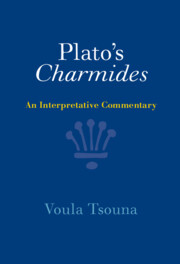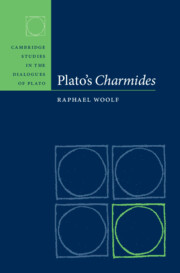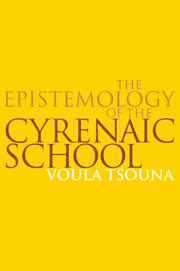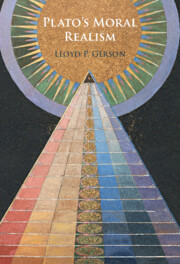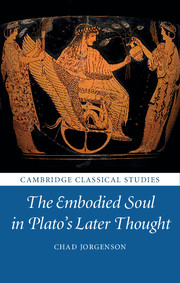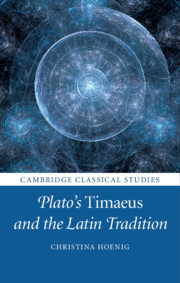Plato's Charmides
An Interpretative Commentary
- Author: Voula Tsouna, University of California, Santa Barbara
- Date Published: November 2023
- availability: Available
- format: Paperback
- isbn: 9781009364928
Paperback
Other available formats:
Hardback, eBook
Looking for an inspection copy?
This title is not currently available on inspection
-
The Charmides is a difficult and enigmatic dialogue traditionally considered one of Plato's Socratic dialogues. This book provides a close text commentary on the dialogue which tracks particular motifs throughout. These notably include the characterization of Critias, Charmides, and Socrates; the historical context and subtext, literary features such as irony and foreshadowing; the philosophical context and especially how the dialogue looks back to more traditional Socratic dialogues and forward to dialogues traditionally placed in Plato's middle and late period; and most importantly the philosophical and logical details of the arguments and their dialectical function. A new translation of the dialogue is included in an appendix. This will be essential reading for all scholars and students of Plato and of ancient philosophy. This title is also available as Open Access on Cambridge Core.
Read more- · Illuminates this difficult and enigmatic dialogue by means of a close and systematic text commentary · Shows how the interplay of the philosophical issues, the characters and the dialectic evolve across the dialogue · Includes a new translation
Reviews & endorsements
'Voula Tsouna's welcome new edition of Plato's Charmides deserves to become the go-to book on this brilliant but too often marginalized dialogue. From the synoptic level all the way down to that of textual fine detail, she combines sensitive adjudication of existing interpretations, analytic subtlety, a keen eye for intertextuality, and a series of fine-tuned responses to the human interactions which frame and carry forward the dialogical narrative.' David Sedley, Laurence Professor of Ancient Philosophy Emeritus, University of Cambridge
See more reviews'Written with an accessible clarity, Tsouna weaves together a comprehensive account of both the arguments and the dramatic action of this difficult dialogue, situating it in broader philosophical and political contexts. With all this, she offers an original and creative reading of the dialogue as a whole.' Melissa Lane, Class of 1943 Professor of Politics, Princeton University
Customer reviews
Not yet reviewed
Be the first to review
Review was not posted due to profanity
×Product details
- Date Published: November 2023
- format: Paperback
- isbn: 9781009364928
- length: 357 pages
- dimensions: 229 x 152 x 19 mm
- weight: 0.518kg
- availability: Available
Table of Contents
1. Introduction
2. The prologue (153a1-159a10)
3. Charmides' first definition of sôphrosynê: Temperance is a kind of quietness (159b1-160d4)
4. Charmides' second definition: Temperance is a sense of shame (160d5-161b4)
5. Charmides abandons 'the best method'. The third definition: Temperance is 'doing one's own (161b4-162b11)
6. Enter Critias. The third definition revisited: Temperance is the doing or making of good things (162c1-164d3)
7. Critias' speech. Temperance is knowing oneself (164d4-165b4)
8. Socrates and Critias debate the technê analogy. From 'knowing oneself' to 'the knowledge of itself' (165b5-166e3)
9. Critias' final definition: Temperance is 'the science of itself and the other sciences' or 'the science of science' (166e4-167a8). The third offering to Zeus (167a9-c8)
10. Can there be an epistêmê of itself? The Argument from Relatives (167c8-169c2)
11. The Argument from Benefit (169c3-175a8)
12. The Epilogue
Appendix: Plato's Charmides. Translation. Alternative format
Bibliography.-
General Resources
Find resources associated with this title
Type Name Unlocked * Format Size Showing of
This title is supported by one or more locked resources. Access to locked resources is granted exclusively by Cambridge University Press to lecturers whose faculty status has been verified. To gain access to locked resources, lecturers should sign in to or register for a Cambridge user account.
Please use locked resources responsibly and exercise your professional discretion when choosing how you share these materials with your students. Other lecturers may wish to use locked resources for assessment purposes and their usefulness is undermined when the source files (for example, solution manuals or test banks) are shared online or via social networks.
Supplementary resources are subject to copyright. Lecturers are permitted to view, print or download these resources for use in their teaching, but may not change them or use them for commercial gain.
If you are having problems accessing these resources please contact [email protected].
Sorry, this resource is locked
Please register or sign in to request access. If you are having problems accessing these resources please email [email protected]
Register Sign in» Proceed
You are now leaving the Cambridge University Press website. Your eBook purchase and download will be completed by our partner www.ebooks.com. Please see the permission section of the www.ebooks.com catalogue page for details of the print & copy limits on our eBooks.
Continue ×Are you sure you want to delete your account?
This cannot be undone.
Thank you for your feedback which will help us improve our service.
If you requested a response, we will make sure to get back to you shortly.
×
